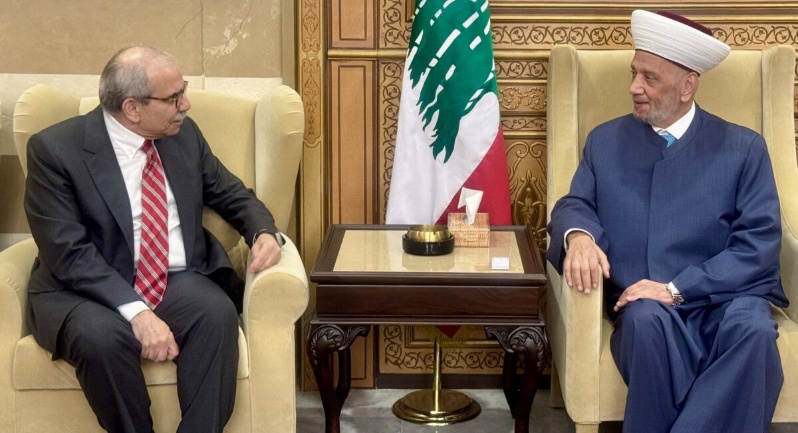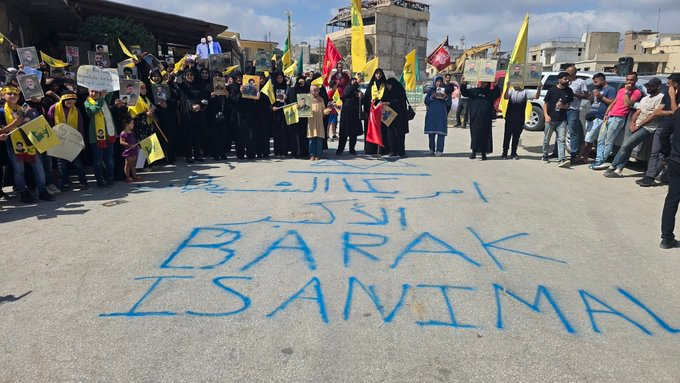 A demonstration in al-Khiyam protests Barrack’s visit (X account of al-Manar network correspondent, Ali Shaib, August 27, 2025).
A demonstration in al-Khiyam protests Barrack’s visit (X account of al-Manar network correspondent, Ali Shaib, August 27, 2025).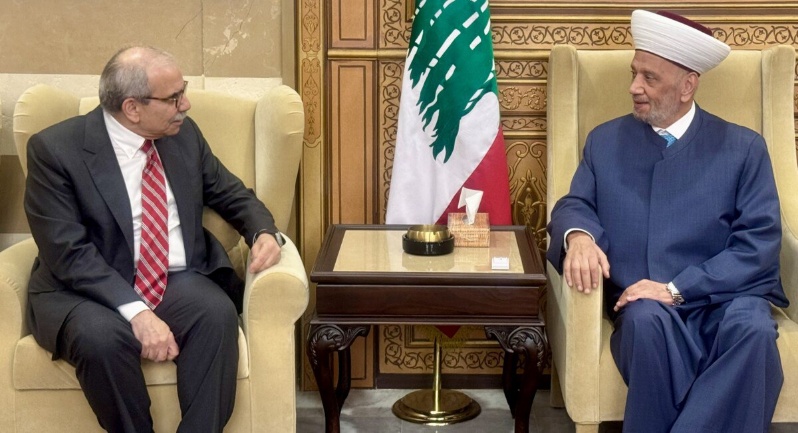 Salam (left) and el-Sisi (Facebook page of the Egyptian government, August 27, 2025)
Salam (left) and el-Sisi (Facebook page of the Egyptian government, August 27, 2025)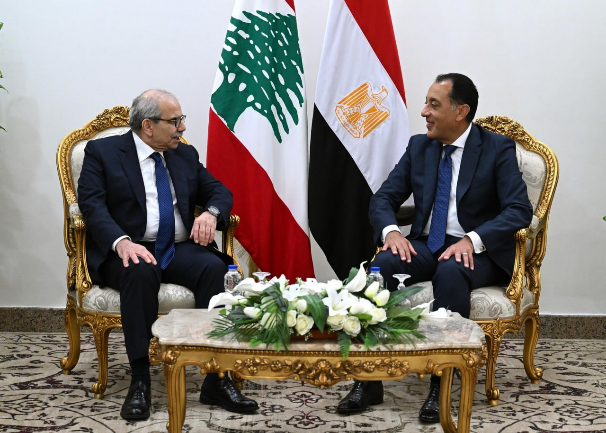 Salam (left) and Mufti Daryan (al-Nashra, August 30, 2025)
Salam (left) and Mufti Daryan (al-Nashra, August 30, 2025)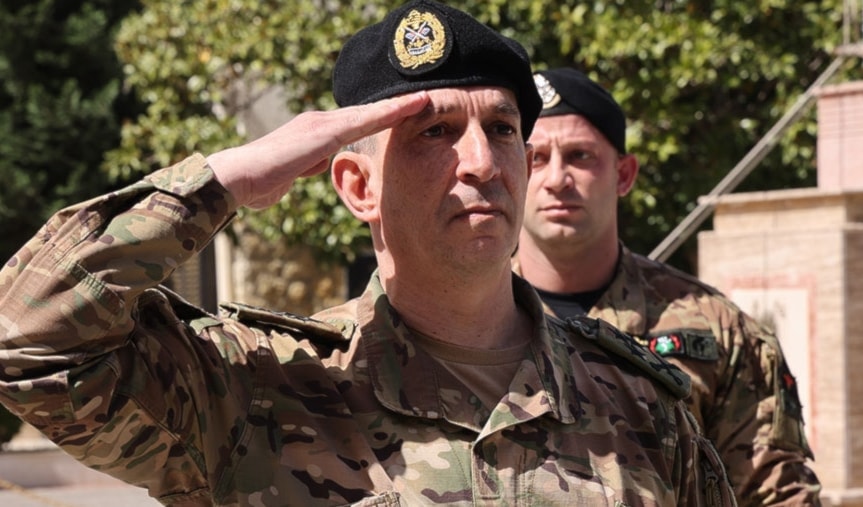 Lebanese army commander Rodolf Haykal (al-Akhbar, August 29, 2025)
Lebanese army commander Rodolf Haykal (al-Akhbar, August 29, 2025)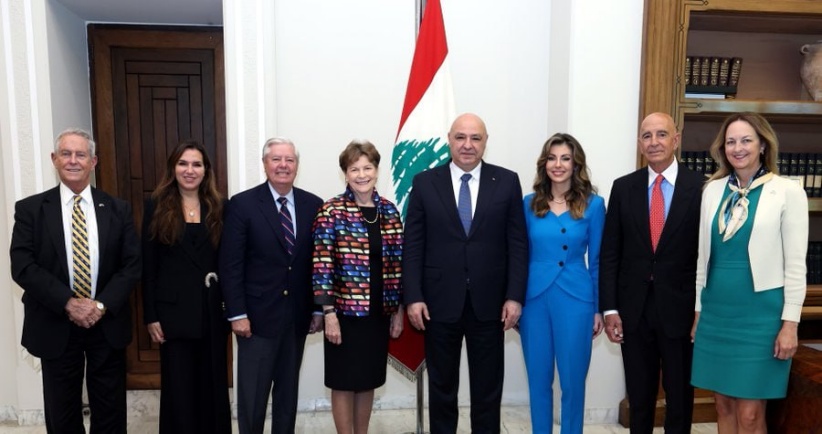 Aoun and the American delegation (Lebanese National News Agency, August 26, 2025)
Aoun and the American delegation (Lebanese National News Agency, August 26, 2025)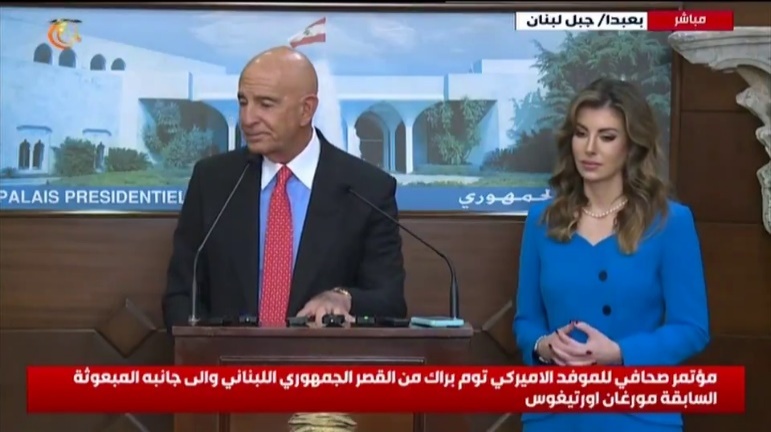 Ortagus and Barrack at the press conference (al-Mayadeen, August 26, 2025).
Ortagus and Barrack at the press conference (al-Mayadeen, August 26, 2025).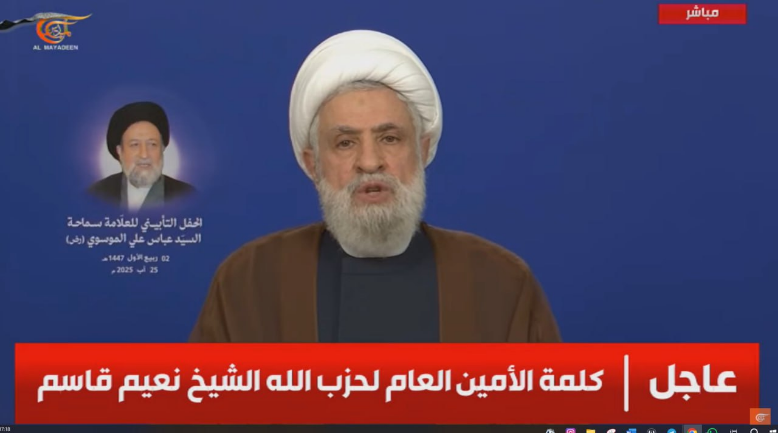 Na’im Qassem gives his speech (al-Manar, August 25, 2025)
Na’im Qassem gives his speech (al-Manar, August 25, 2025)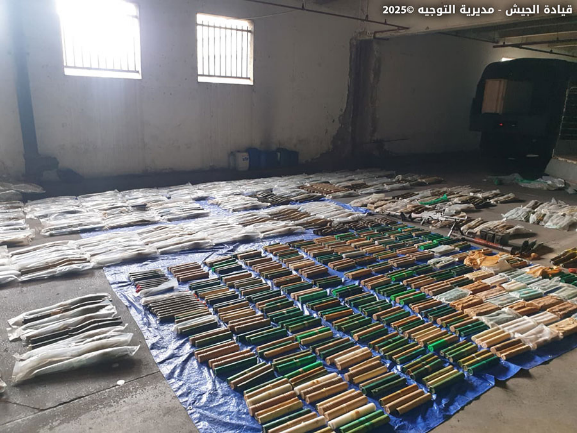 Weapons collected from the Burj al-Barajneh camp (Lebanese army X account, August 29, 2025)
Weapons collected from the Burj al-Barajneh camp (Lebanese army X account, August 29, 2025)
Overview[1]
IDF forces attacked Hezbollah infrastructure and eliminated operatives of the organization as part of ongoing operations against Hezbollah’s presence in south Lebanon, which violates the ceasefire agreement understandings, and against Hezbollah’s efforts to increase its military capabilities and restore its arsenal. The forces attacked underground infrastructures in the Beaufort ridge and eliminated two Hezbollah terrorist operatives.
Hezbollah supporters prevented the American special envoy, Thomas Barrack, from visiting two locations in south Lebanon.
The UN Security Council approved extending UNIFIL’s mandate until the end of 2026, after which the UN force will begin to withdraw and transfer full responsibility to the Lebanese army.
The Lebanese government meeting to present the army’s plan for Hezbollah’s disarmament was postponed to September 5, 2025. A Hezbollah-affiliated newspaper claimed the army said it could not implement the plan because of lack of resources, and the army commander threatened to resign if he were required to spill Lebanese blood. The Lebanese army stated it was acting according to directives to preserve the state’s security. Hezbollah secretary general, Na’im Qassem, and other Hezbollah officials reiterated that they had no intention of surrendering the weapons of the “resistance,” but Lebanese Parliament speaker Berri said they were prepared to hold a dialogue on the issue. Lebanese government officials expressed frustration over Israel’s refusal to present practical steps for the withdrawal of IDF forces from south Lebanon and for stopping its attacks.
The PLO and Fatah continued handing over weapons and military equipment from the Lebanese refugee camps, focusing on the three camps in the Tyre area. According to reports, Qatar was trying to mediate between the Lebanese government and Hamas, which still refused to hand over its weapons.
Implementing the Ceasefire
The IDF
The IDF continued to attack Hezbollah targets in south Lebanon, whose presence south of the Litani River violated the ceasefire agreement of November 27, 2024, and against Hezbollah’s efforts to increase its military capabilities and restore its arsenal. The forces attacked Hezbollah’s underground facilities in the Beaufort ridge, weapons depots, rocket and missile launchers and other military equipment in south Lebanon. IDF ground forces destroyed a building used for military activity in Ayta al-Sha’ab, and two Hezbollah operatives were eliminated, including a senior field commander in Hezbollah’s elite Radwan force (IDF spokesperson, August 25 – September 1, 2025). The Lebanese ministry of health reported two killed in Israeli attacks in south Lebanon (al-Nashra, August 25 – September 1, 2025).
Hezbollah
Hezbollah secretary general Na’im Qassem gave a speech at a memorial ceremony for the Shi’ite cleric Abbas Ali al-Musawi. He said Lebanon had to restore sovereignty over its lands and that all the country’s problems came from “the enemy, the occupation and American support.” He added that the Lebanese government was responsible for developing a plan for imposing its sovereignty and there would be no stability or reforms without it. He called on the government to hold “intensive dialogue on how sovereignty can be restored through diplomacy, arming the army, a defense strategy and whatever else would help.” He also urged the parties, elite groups and other influential bodies in Lebanon to help the government by proposing plans (al-Manar, August 25, 2025).
Hezbollah political council deputy chairman Mahmoud Qamati claimed that the “resistance” had not been defeated during the fighting against Israel, and had prevented Israel from “invading” Lebanese territory. He claimed the “resistance” was capable of forcing the “occupation” to leave the five points it still held in south Lebanon, just as it had “expelled” it from Beirut and from south Lebanon in the past (al-Jazeera, August 26, 2025).
On August 27, 2025, the American special envoy to Lebanon, Thomas Barrack, arrived for a visit in the Dahiyeh al-Janoubia to examine the area where a free-trade zone was supposed to be established on the border, a plan being formulated by the American administration. Barrack visited a Lebanese army base in Marjayoun in south Lebanon, and afterwards was supposed to tour the city of Tyre and the town of al-Khiyam. However, he canceled the visit after Hezbollah supporters held protest demonstrations in the two locations. In al-Khiyam, Hezbollah flags were waved and pictures of the organization’s dead, headed by the former secretary general, Hassan Nasrallah, were held and signs with slogans criticizing Barrack and the American administration were displayed. In Tyre, residents prepared to throw tomatoes at Barrack’s convoy (al-Manar and Telegram channel of South Lebanon–Observer of the Enemy, August 27, 2025).
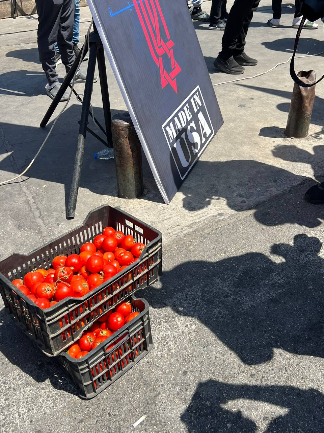

Right: A demonstration in al-Khiyam protests Barrack’s visit (X account of al-Manar network correspondent, Ali Shaib, August 27, 2025). Left: Tomatoes prepared for throwing (X account of Dalal Mansour, August 27, 2025)
The Lebanese Government
Lebanese Prime Minister Nawaf Salam visited Egypt, where he met with senior officials and thanked them for their support of Lebanon. Egyptian President Abdel Fattah al-Sisi met with Salam to discuss Egypt’s ongoing contacts with various international and regional parties to ensure Lebanon’s stability and Israel’s withdrawal from south Lebanon. He also praised the “positive steps” taken by the Lebanese government in recent months to expand its authority throughout the country (Egyptian presidency website, August 27, 2025); Egyptian Foreign Minister Badr Abdelatty reiterated his country’s support for Lebanon, especially “in light of Israel’s repeated violations.” He also called on the international community to increase support for Lebanon’s reconstruction efforts (al-Nashra, August 27, 2025); Egyptian Prime Minister Mostafa Madbouly confirmed his country’s support for Lebanon in light of the “Israeli violations” of the ceasefire agreement, and noted the need for Israel’s full withdrawal from south Lebanon. He added that Egypt was committed to Lebanon’s unity and territorial integrity and to providing Beirut with all necessary assistance (Facebook page of the Egyptian government, August 27, 2025).

Salam (left) and el-Sisi (Facebook page of the Egyptian government, August 27, 2025)
Prime Minister Salam met with Lebanon’s Sunni Mufti, Abd al-Latif Daryan, and told him that the government would continue its efforts to achieve the necessary reforms and expand state authority over all of Lebanon’s territory through its forces. He said the Lebanese government would spare no effort to preserve every centimeter of the country’s territory (al-Nashra, August 30, 2025).

Salam (left) and Mufti Daryan (al-Nashra, August 30, 2025)
Nabih Berri, speaker of the Lebanese Parliament, said that even after the Lebanese government had approved the document presented by the American special envoy Thomas Barrack, Israel “occupied” more territory in Lebanon, increased its “aggression” and blocked more than 40 towns. In a speech for the 47th anniversary of the disappearance of Musa al-Sadr, founder of the Amal movement, he said Lebanon had fully implemented the ceasefire agreement and that even UNIFIL had confirmed it, while “the Israeli entity did not comply with any of the clauses.” Berri also claimed that the American proposals were intended to “impose” on Lebanon an agreement different from the ceasefire agreement formulated in November 2024. He added that statements by Prime Minister Netanyahu about the dream of a “Greater Israel” and the visit of the Israeli chief of staff to south Lebanon were an “insult” to Lebanon’s sovereignty (al-Nashra, August 31, 2025).
The Lebanese army
The Lebanese army reported that an officer and a soldier were killed when an Israeli UAV which had crashed in the al-Naqoura area in south Lebanon exploded while it was being examined. Two other soldiers were injured in the incident. The army commander, Rodolf Haykal, attended the soldiers’ funeral (X account of the Lebanese army, August 28–29, 2025).
The Lebanese army announced that its forces had located and dismantled a “camouflaged spy device” equipped with a camera, which had been placed by the “Israeli enemy” on the Yaroun–Bint Jbeil road (al-Diyar, August 30, 2025).
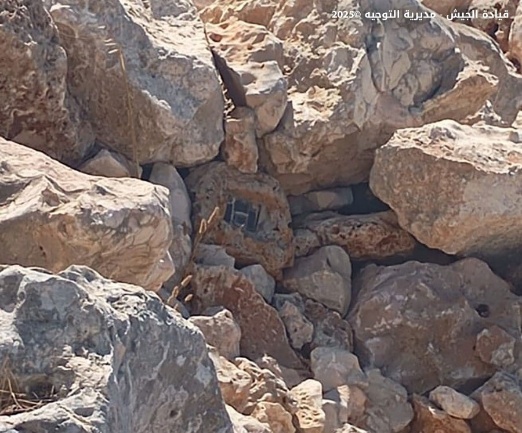
“The Israeli spy device” located by the Lebanese army (al-Nashra, August 30, 2025)
UNIFIL
The UN Security Council unanimously approved the extension of UNIFIL’s mandate in south Lebanon until the end of 2026. Afterwards, an “orderly and safe withdrawal” of UNIFIL forces would begin, lasting about a year, during which exclusive responsibility would be transferred to the Lebanese army (Reuters, August 28, 2025). Lebanon welcomed the decision to keep the UN forces for another year:
Lebanese President Joseph Aoun thanked the representatives of the Security Council’s 15 member countries who voted in favor of the decision. He expressed hope that the next 16 months of UNIFIL’s work would be an opportunity to save the situation in Lebanon and establish stability on the southern border (X account of the Lebanese presidency, August 28, 2025). Aoun also spoke with French President Emmanuel Macron and thanked him for his efforts to reach an agreement on the extension of UNIFIL’s mandate. They discussed ongoing preparations for forming two international committees, one for the reconstruction of Lebanon and the other to support the Lebanese army (Lebanese News Agency, August 28, 2025).
Lebanese Prime Minister Nawaf Salam thanked the countries which participated in the negotiations for the extension of UNIFIL’s mandate, especially France. He said the decision was a call to the international community to increase its support for the Lebanese army, to activate the mechanism established in the ceasefire arrangement between Lebanon and Israel and to cooperate with UNIFIL to ensure its implementation (al-Nashra, August 28, 2025).
Nabih Berri, speaker of the Lebanese Parliament, said 47 years of UNIFIL presence south of the Litani River demonstrated all Lebanon’s commitment to international legitimacy and its decisions that safeguarded their rights on their land. Berri said he hoped another international consensus would be reached for the implementation of UN Security Council Resolution 1701, which would put an end to Israel’s ongoing attacks against the country (al-Nashra, August 28, 2025).
Following the decision to extend UNIFIL’s mandate only until the end of 2026 and the cessation of its activity in the following months, Irish Defense Minister Simon Harris suggested that military personnel from EU countries provide training and support for Lebanese army forces to improve their capabilities. He noted that a similar model had successfully operated in Bosnia and Herzegovina and in Ukraine (RTE News, August 29, 2025).
In preparation for the Security Council discussion, UNIFIL published an announcement updating its ongoing activities in Lebanon. It said the UN forces patrolled in south Lebanon to monitor the implementation of Resolution 1701, adding that through patrols, support for the Lebanese army and assistance to local communities, UNIFIL helped reduce tensions and created conditions for lasting stability (Telegram channel of UNIFIL force, August 26, 2025).
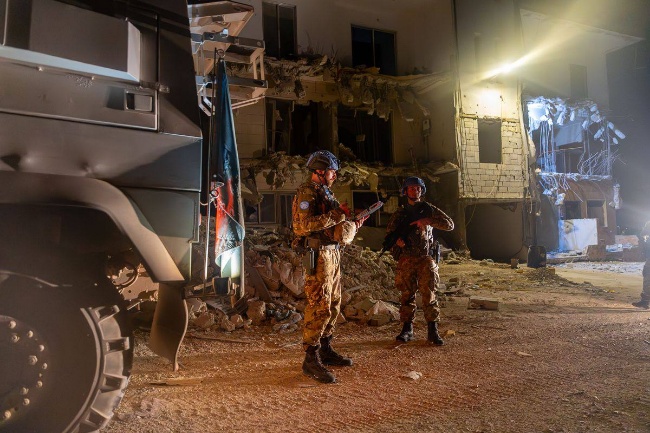
UNIFIL force on patrol in south Lebanon (Telegram channel of the UNIFIL force, August 26, 2025)
According to “Lebanese sources,” soldiers of UNIFIL’s French battalion located a Hezbollah launcher and rockets near the village of Mari, east of al-Khiyam (France 24, August 28, 2025).
Residents of the town of al-Dalafa in south Lebanon north of the Litani River prevented a UNIFIL patrol from entering because it had arrived without the accompaniment of the Lebanese army (Telegram channel of the town of Blida, August 28, 2025).
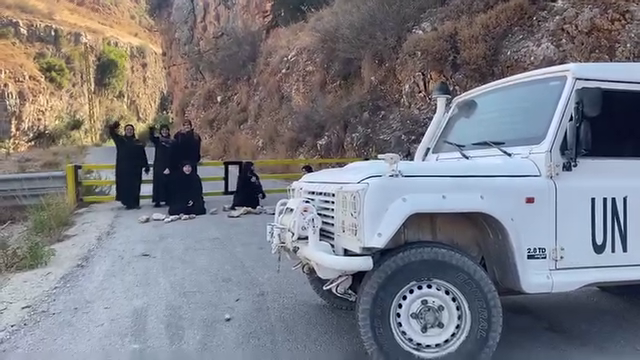
Women blocking UNIFIL forces at the entrance to the town of al-Dalafa
(Telegram channel Hezbollah’s Baa’s Shadeed News, August 28, 2025)
Disarming Hezbollah[3]
Preparations for the Presentation of the Army’s Disarmament Plan
The Lebanese government session in which the Lebanese army was supposed to present its plan to guarantee the state’s monopoly on weapons, including the disarmament of Hezbollah in accordance with the government’s August 5, 2025 decision, was postponed from September 2 to September 5, 2025 (al-Nashra, August 29, 2025). “Sources” reported that parliament speaker Nabih Berri told Deputy Prime Minister Tarek Mitri that if the session focused only on the army’s plan, it would signal willingness to escalate the situation, Hezbollah’s two ministers would boycott the session and Amal’s ministers would walk out. As a result, Mitri and associates of Prime Minister Salam recommended postponing the session to Friday to allow further consultations (al-Akhbar, September 1, 2025). However, “government sources” reported that the ministers from Hezbollah and Amal would not absent themselves and no demonstrations were expected during the session (al-Sharq al-Awsat, September 1, 2025).
Ahead of the government session, Hezbollah’s daily al-Akhbar published a series of reports pointing to alleged opposition within the Lebanese army command to any attempt to disarm Hezbollah if it were to lead to a direct confrontation between the sides:
“Sources familiar with the details” reported that the Lebanese army was concealing the stages of the plan to disarm Hezbollah, and it had conveyed messages to senior Lebanese officials that it was unable to carry it out across all Lebanese territory due to lack of resources. It was further reported that the army insisted on not clashing with any party within Lebanon and sought to reach understandings with all “factions” to prevent an internal confrontation (al-Akhbar, August 26, 2025).
“Informed sources” claimed that Lebanese army commander Rodolf Haykal had said he would rather resign his command than spill Lebanese blood. Reportedly, the authorities involved in the matter received confirmation that the military command levels had refused to develop an operational plan with a list of targets or a timetable to disarm the “resistance” (al-Akhbar, August 29, 2025).
“Military sources” said that the Lebanese army command was intent on preventing any split within the military establishment and believed that being dragged in that direction would lead to an upheaval in its internal structure, which in recent years remained cohesive despite political crises. Likewise, “political elements familiar with the army’s activity” expressed concern about a split within its ranks and the possibility of a direct confrontation between it and Hezbollah under pressure from the political echelon. “Sources close to the Shi’ite duo” [Hezbollah and Amal] said a clash between the army and Hezbollah was out of the question and would not occur, since the military establishment was an element of national balance (al-Akhbar, August 30, 2025).
In response to the reports, the Lebanese army stated that the media had to refrain from discussing the affairs of the military and not speculate about its decisions. The army claimed it carried out its missions responsibly and professionally, and was committed to safeguarding the security of the state and its internal stability in accordance with the decisions of the political authority and its duty (Lebanese army X account, August 29, 2025).

Lebanese army commander Rodolf Haykal (al-Akhbar, August 29, 2025)
Even before the presentation of the army’s disarmament plan, Lebanese Defense Minister Michel Manassa stated that weapons would be collected gradually. He said they would begin in the area south of the Litani River and the weapons would be collected from all armed groups, from Hezbollah and from the Palestinian “factions,” claiming the Lebanese government was not afraid of a civil war. He said that the Lebanese were moving toward peace because “we know how to reach understandings among ourselves” (al-Arabiya, August 28, 2025).
Prime Minister Nawaf Salam said he was determined to move forward with the plan for the state’s monopoly on weapons and called for international community support for the government and the army. He said, “People say that I am stubborn and not diplomatic, but I refuse to compromise my principles,” and expressed hope that the Lebanese people would give a chance to his proposal of a gradual approach (Financial Times, August 29, 2025).
Visit of the American Delegation
On August 26, 2025, United States special envoy to Lebanon Thomas Barrack and deputy special envoy for the Middle East Morgan Ortagus arrived in Beirut, this time together with a delegation from the United States Senate led by senior Republican senator Lindsey Graham. The delegation members met with Lebanese President Joseph Aoun, Prime Minister Nawaf Salam, Parliament Speaker Nabih Berri, and Army Commander Rodolf Haykal. Their talks focused on implementing plans to guarantee the state’s monopoly on weapons and the Lebanese demand for the withdrawal of the IDF from south Lebanon and for an end to Israeli attacks:
President Aoun thanked the delegation members for their commitment to help Lebanon and for their support of the Lebanese army. He praised the American vision based on the state’s exclusivity over weapons and its authority to decide on war or peace, guaranteeing Lebanon’s economic prosperity, and maintaining orderly democracy in the country (Lebanese National News Agency, August 26, 2025).

Aoun and the American delegation (Lebanese National News Agency, August 26, 2025)
After the meeting with Aoun, Barrack said that he had not yet seen the Lebanese plan, but it was said to be composed of 11 stages, the first of which concerned disarming Hezbollah. Barrack said every Hezbollah operative who handed over his weapon would be offered financial compensation. He said Israel had declared it did not want to occupy lands in Lebanon and that it was prepared for withdrawal and to move “step by step” with Lebanon, but that it wanted to see concrete steps. Barrack added that Iran had funded Hezbollah in the past, but now the Gulf states would invest in Lebanon, and the United States would be responsible for creating a new economic zone in the south (Reuters, al-Jadid, August 26, 2025).
After the meeting with Aoun, Graham said Hezbollah’s agenda did not align with Lebanon’s interests. He claimed the organization served foreign agendas and not the Lebanese people’s interest, and that nothing could be demanded from Israel before Hezbollah was disarmed. He also said that Israeli Prime Minister Netanyahu would have to look at Lebanon differently once Hezbollah had been disarmed. Democratic Senator Jeanne Shaheen said she had told President Aoun that she understood Hezbollah’s disarmament was not simple and that the United States was ready to support and fund the Lebanese army (al-Arabiya, August 26, 2025).
Meeting with Prime Minister Salam, the delegation praised the recent government decisions regarding the weapons monopoly. Salam said they had already begun implementing the decisions and there was no turning back. He said the Lebanese army was developing a comprehensive plan on the subject and which “was a Lebanese national necessity.” He added that the expansion of economic and military support for the Lebanese army was needed urgently to allow the army to fulfill its role. He also said Lebanon sought a clear international commitment regarding preparations for the upcoming conference on Lebanon’s economic reconstruction (al-Nashra, August 26, 2025). Salam later reported that no progress had been made in the last round of talks between the Lebanese leadership and representatives of the American administration since Israel still refused to commit to the “step for step” principle, as Barrack had promised in the document to which the Lebanese government had agreed (al-Sharq al-Awsat, August 29, 2025).
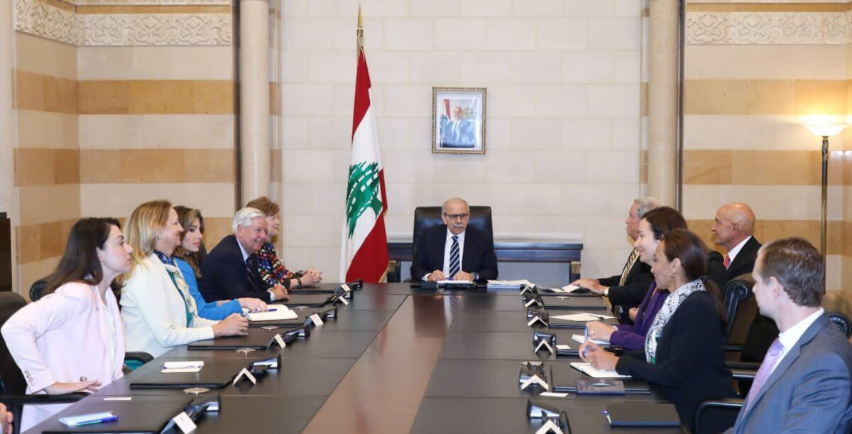
Salam meets with the American delegation (al-Nashra, August 26, 2025)
Nabih Berri, speaker of the Lebanese Parliament, said the results of the American delegation’s visit had frustrated him and claimed they “gave us the opposite of what they had promised.” He said the American delegation had brought nothing from Israel and thus “things became complicated again.” He refused to talk about the next stage, blaming the “complexity,” but said “things are not easy” (al-Sharq al-Awsat, August 27, 2025). On another occasion, Berri said that in his last conversation with Barrack and Ortagus there was a united American position, namely that there would be no Israeli withdrawal from Lebanon if Hezbollah were not disarmed. He said the Lebanese had paid the price for the war and were unwilling to pay more (Asas Media, August 29, 2025).
At a dinner attended by about 50 senior Lebanese figures, including ministers and parliament members, Morgan Ortagus said Hezbollah secretary general Na’im Qassem represented not Lebanon but Iran, and the Lebanese president, prime minister, and even Parliament Speaker Berri wanted a strong, independent, sovereign Lebanon (This is Beirut, August 26, 2025).
Reportedly, the American delegation told senior Lebanese officials that Lebanon had to produce a plan for Hezbollah’s disarmament before anything else could be discussed, and that the United States had prepared a reconstruction plan for Lebanon which included rehabilitating buildings, establishing industrial zones, compensation and providing employment opportunities, and was waiting for the Lebanese army to implement its plan. In response, “military sources” reported that it would not be possible to take Hezbollah’s weapons by force (al-Jadeed, August 26, 2025).
Later, “sources with extensive knowledge of the talks” said the public statements of the American delegation were no different from what was said to the Lebanese leadership in the meetings, namely that Hezbollah had to be disarmed and the plan being prepared by the Lebanese army had to be examined so it could be presented to Israel. “Political sources” reported that during the meetings Parliament Speaker Berri had repeatedly rejected the idea of establishing a buffer zone on the border with Israel and reiterated the need to return the residents of the south to their villages, return the “prisoners,” begin the reconstruction process and end the attacks. “Additional sources” reported that one of the clauses in the American plan stipulated that the Dahiyeh al-Janoubia, the southern suburb of Beirut and a Hezbollah stronghold, should be treated like the Palestinian refugee camps, including the establishment of checkpoints at its entrances, inspecting those entering and leaving, imposing strict restrictions on the entry of goods, and close scrutiny of their origins and destinations. According to the “sources,” that would not be assigned to the Lebanese army at first but to a foreign security body, possibly with an “Arab background” (al-Akhbar, August 27, 2025).
The visit of the American delegation was overshadowed by an incident at the press conference held by Barrack and Ortagus at the presidential palace, during which the American envoy scolded the Lebanese journalists and threatened he would leave if the event turned “animalistic or barbaric.” He called on the journalists to behave “in a civilized manner” and added, “Do you think this has been a fun press conference? Do you think it was economically worthwhile for us to come here and deal with all this madness?” In response, calls were raised in Lebanon for Barrack to apologize and for the American ambassador to be summoned for a reprimand (al-Jazeera, August 27, 2025).
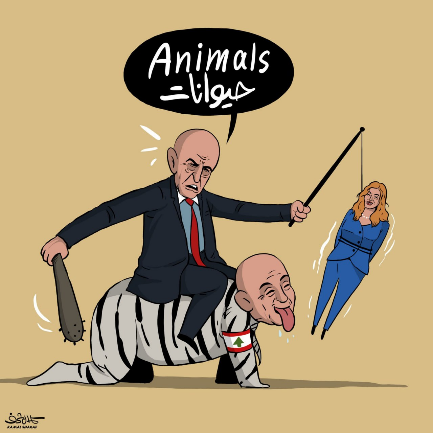

Right: Ortagus and Barrack at the press conference (al-Mayadeen, August 26, 2025). Left: Cartoon by Yemeni Kamal Sharaf, a supporter of the “resistance axis,”[4] depicting Barrack riding Lebanese president Aoun and yelling “Animals” (X account of Kamal Sharaf, August 26, 2025)
Hezbollah
Hezbollah secretary general Na’im Qassem gave a speech at a memorial ceremony for the Shi’ite cleric Abbas Ali al-Musawi. He said they were not prepared to give up the weapons that granted them “dignity and protection,” and they would not allow Israel “to operate freely and kill ‘resistance fighters’.”[5] He said they had already “sacrificed” 5,000 fighters and commanders, and the demand to disarm the “resistance” meant “taking away our spirit,” and such a thing would lead the world to witness the “power of the resistance.” He claimed that the government decision to disarm Hezbollah had been the result of Israeli and American “dictates,” and he accused the United States of financing the corruption and collapse of the country. Qassem reiterated that the preferred roadmap for disarming was based on Israel’s withdrawal from Lebanon, halting “aggression,” releasing the prisoners held by Israel, beginning reconstruction in Lebanon, and dialogue on a national defense strategy. He used the speech to reiterate the importance of the “resistance,” which, he said, “would remain an obstacle for Israel’s achieving its objectives” since it was still capable of “confronting” Israel. He added that the “resistance” was “the opposite of humiliation” and was not a substitute for the army, but supported it since the army was the main body responsible for defending the homeland (al-Manar, August 25, 2025).

Na’im Qassem gives his speech (al-Manar, August 25, 2025)
After Qassem’s speech, Hezbollah reiterated that they were not prepared to give up their weapons and they would be willing to talk about formulating a national defense strategy only after all other demands were met, especially the withdrawal of the IDF and the end of “aggression:”
Hussein al-Hajj Hassan, a member of the Hezbollah faction in the Lebanese Parliament, said that the Lebanese government had made a grave mistake by deciding to disarm the “resistance,” and accused it of ignoring “Israeli aggression, the hundreds of dead and wounded and the prisoners. It neglected reconstruction and surrendered to the demands of the Zionist enemy and American dictates.” He claimed that the government’s decision was illegal, and Hezbollah therefore would not hand over their weapons. He added that Amal and Hezbollah were one united force and that they were ready for dialogue on a national security strategy which would defend Lebanon, ensure the withdrawal of the “Israeli enemy” from the “occupied” Lebanese territories, and secure the return of the prisoners (al-Nashra, August 25, 2025).
Mahmoud Qamati, deputy chairman of Hezbollah’s political council, said the Lebanese government’s decision to limit weapons damaged Lebanese sovereignty. He said an attempt to disarm the “resistance” would lead to grievous responsibility and a wide popular reaction, but added that Hezbollah did not want a civil war (al-Jazeera, August 26, 2025).
“Hezbollah parliamentary sources” claimed the United States wanted to ensure Hezbollah’s disarmament but at the same time was discussing the Israeli withdrawal only to “later renounce it.” The “sources” added that no one handed over their bargaining chips before making sure their position was secure (al-Jadeed, August 26, 2025).
Hussein al-Khalil, political aide to Hezbollah’s secretary general, claimed that the American administration was working to weaken Lebanon’s defensive capabilities and lead it to surrender. He said the government had made wrong decisions under American pressure, and the attempts to disarm Hezbollah violated previous understandings. He accused the United States of shirking its responsibility for causing the situation in Lebanon and of trying to drive a wedge between the Lebanese army and Hezbollah. Al-Khalil warned of the danger of civil war and called on the leadership to act for the independence and stability of the country (al-‘Ahed, August 27, 2025).
Hassan Izz al-Din, a member of the Hezbollah faction in the Lebanese Parliament, said the government’s decision to concentrate weapons in the hands of the state was a “great sin” because it did not take into account the implications, dangers and consequences. He said that the purpose of the decision was to confiscate the weapons of the “resistance,” which still “deterred the enemy and prevented it from achieving its objectives.” He added that the Lebanese government had to make a political decision to make it possible for the army to defend itself, the sovereignty of the state and the Lebanese people when attacked. He noted that the army should be supplied with weapons that would enable it to fulfill its role and face the “enemy,” such as air defenses, fighter jets and naval capabilities, but that could only be realized with American approval, and he wondered if the government had the courage to make such a decision (al-Manar, August 31, 2025).
Hezbollah released a propaganda video entitled, “The weapons we are proud of… We will never give them up.” It showed Hezbollah operatives armed during combat and drills, voice-overed by the organization’s secretary general, Na’im Qassem, saying that “the resistance is dignity, strength, nationalism, and sovereignty” (Hezbollah combat information Telegram channel, August 28, 2025)
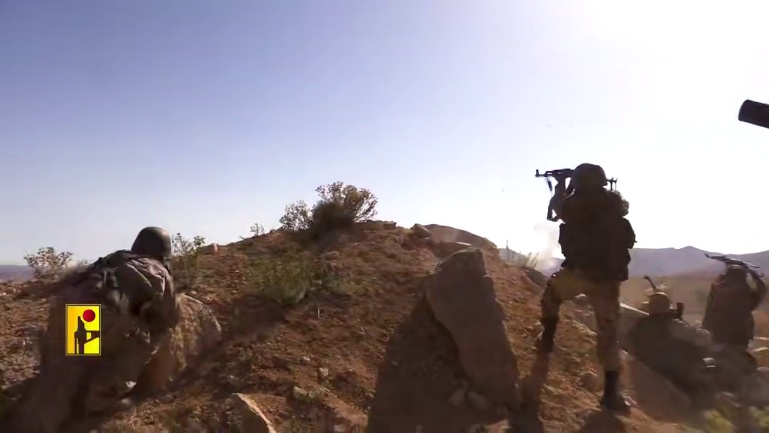
From the propaganda video (Hezbollah combat information Telegram channel, August 28, 2025)
In preparation for the government meeting, the “Shi’ite duo” reportedly said the coming week would be important and could go in two opposite directions: either the government would change its decision regarding disarmament or the situation in Lebanon would escalate. They noted that street demonstrations were on the agenda if the government continued its policy, and stressed that the Lebanese army’s ability to deal with the situation depended on political agreement, with no intention of being dragged into internal clashes. “Sources involved in the events” warned that a government crisis might develop which would lead to the dissolution of the government, and it was even possible that relations with Israel would deteriorate over the issue of disarming Hezbollah. According to the report, Hezbollah was unwilling to discuss disarming before an Israeli withdrawal and the release of prisoners, and rejected the possibility of creating a buffer zone in the south. The report indicated that the “Shi’ite duo” thought that an incomplete agreement might cause instability after the government meeting (al-Sharq al-Awsat, August 27, 2025).
Nabih Berri, speaker of the Lebanese Parliament and a close Hezbollah ally, gave a speech marking the 47th anniversary of the disappearance of Amal Movement founder Musa al-Sadr. He said that “we have to beware of words of hatred invading the consciousness and satanic concepts which are more dangerous to Lebanon than the weapons of the resistance, which preserved dignity and national sovereignty.” He also accused some of “gambling on Israeli aggression” and hoping to create an opportunity to revive “old and new projects, even if they come on the back of an Israeli tank.” However, he said they were prepared to hold a discussion on the future of the “resistance’s” weapons, which he said represented “pride and dignity,” in a framework of calm and consensual dialogue under the umbrella of the constitution, the inaugural speech of President Aoun, the guidelines of Salam’s government and international charters and laws. He stressed that they would never surrender to threats, violation of the constitution, bypassing the government’s guidelines or the cancellation of the ceasefire agreement (al-Nashra, August 31, 2025).
Hezbollah and Amal announced the postponement of the protest planned for August 27, 2025, claiming civil calm had to be maintained and any attempt to undermine stability had to be blocked (Telegram channel of South Lebanon—Observer of the Enemy, August 25, 2025). However, Hezbollah and Amal had reportedly decided to begin broad protests against the government’s decision to disarm Hezbollah, mainly by means of labor and student unions. The protests were expected to include demonstrations and the suspension of activity in various sectors in Lebanon (al-Akhbar, August 28, 2025). Lebanese Interior Minister Ahmed al-Hajjar said there was no objection to “peaceful demonstrations” as a protest against the restriction of weapons (al-Hadath, August 25, 2025).
Opponents of Hezbollah
Nadim Gemayel, a member of the Phalange Party faction in the Lebanese Parliament, said Israel had not been present in Lebanon before 2024, but it was Hezbollah’s weapons and the “support war” for the Gaza Strip which Hezbollah began against Israel that caused Israel “to occupy” Lebanese lands and detain Lebanese people who were today being held by Israel. He added that Hezbollah’s actions had brought Lebanon to its current situation, and therefore Hezbollah was not in a position to dictate the conditions for its disarmament (al-Arabiya, August 27, 2025).
Ashraf Rifi, a member of the Sunni faction in the Lebanese Parliament and former justice minister, filed a lawsuit against Hezbollah leader Na’im Qassem after his threats of civil war if the Lebanese government continued to implement its plan to disarm Hezbollah. Rifi said Iran’s role in the region had ended (Arab News, August 27, 2025). Charles Jabbour, head of media for the Lebanese Forces Party, said filing the lawsuit was a natural step to strengthen Lebanon’s sovereign institutions. He said any threat against the state or its representatives would be dealt with legally, and that nobody had the right to threaten the Lebanese people. He said that the complaint was a guarantee for the protection of Lebanese institutions and called on the judiciary to act accordingly (Aram News, August 27, 2025).
Hezbollah and the Reconstruction of Lebanon
“Sources” reported that Hezbollah would announce the allocation of $1 billion for the reconstruction of the Dahiyeh al-Janoubia in Beirut and the areas damaged during the war with Israel, apart from the towns located near the border and towns still under threat of Israeli attack. The “sources” noted that the money and plans were ready, and buildings were expected to be constructed within eight months at the latest (al-Jadeed, August 26, 2025). In response, a “banking source” wondered, “If the report is true, where did Hezbollah get the money from?” (Nidaa al-Watan, August 27, 2025).
The Palestinians in Lebanon
Handing Over Palestinian Weapons[6]
This past week, the collection of weapons from the Palestinian refugee camps continued, with “Lebanese sources” calling it the largest collection operation since the end of the civil war in 1990. According to the “sources,” the government is determined to accelerate the collection of weapons to ensure it continues (al-Hadath, August 28, 2025). On August 28, 2025, the second phase of the collection of weapons took place, focusing on the al-Rashidiya, al-Buss and al-Burj al-Shamali refugee camps in south Lebanon, and reportedly Fatah handed over eight trucks to the Lebanese army with heavy and medium weapons, including Katyusha rockets, mines and artillery shells (al-Akhbar, August 29, 2025). Weapons and other military equipment were also transferred from the Burj al-Barajneh refugee camp in Beirut, where collecting
weapons began on August 21, 2025 (Lebanese army X account, August 29, 2025).

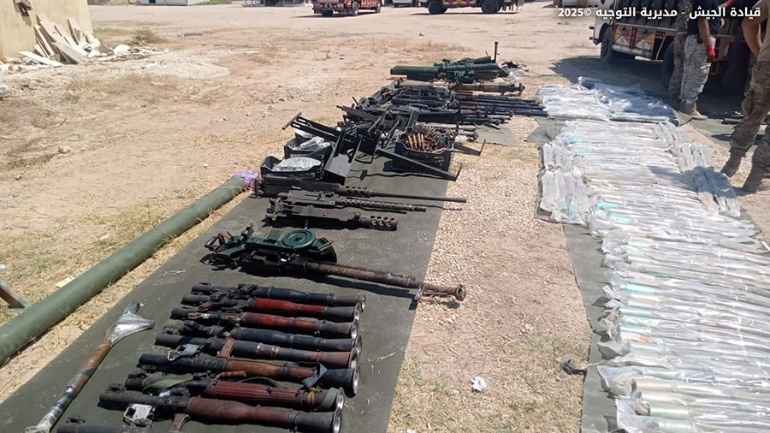
Right: Weapons collected.
from the refugee camps in south Lebanon (Lebanese army X account, August 28, 2025). Left: Weapons collected from the Burj al-Barajneh camp (Lebanese army X account, August 29, 2025)
Nabil Abu Rudeineh, spokesman for Palestinian Authority chairman Mahmoud Abbas, confirmed that the weapons in the al-Buss, al-Rashidiya and al-Burj al-Shamali camps were handed over to the Lebanese army in accordance with the joint announcement of the Palestinian Authority chairman and the Lebanese president of May 21, 2025, on concentrating weapons in the hands of the Lebanese state. He said more weapons would be transferred in the future. He added that a joint committee would be established to manage the affairs of the camps and improve the conditions of the refugees while preserving Lebanon’s sovereignty, and that both sides noted the protection of the rights of the refugees without harming the “right of return”[7] (Wafa, August 28, 2025). Subhi Abu Arab, Palestinian national security chief in Lebanon, announced that the heavy weapons from the refugee camps in the Tyre area had been handed over to the Lebanese government and that the Palestinians intended to continue handing over weapons in all the other refugee camps in Lebanese territory (al-Araby al-Jadeed, August 28, 2025).
Palestinian Authority chairman Mahmoud Abbas spoke with Lebanese Prime Minister Nawaf Salam to discuss recent developments in the area. Salam praised Abbas’ positions and his efforts to safeguard Lebanon’s security, sovereignty and stability, including the transfer of the PLO’s weapons from the Palestinian camps to the Lebanese army. Abbas thanked Lebanon for its support of the Palestinian issue and the two-state solution, and stressed the importance of the ministers’ declaration on the exclusivity of weapons in the hands of the state and the respect for Lebanon’s sovereignty, independence and territorial integrity (Wafa, August 29, 2025).
Lebanese Defense Minister Michel Manassa said there was a plan to disarm the Palestinian refugee camps in stages, which had begun in some camps. He added that there had been a positive response to the plan from all the PLO-affiliated organizations, and negotiations were being conducted with the organizations outside the PLO framework, such as Hamas and the Palestinian Islamic Jihad. He said the Palestinian refugee camps would be completely disarmed in accordance with Resolution 1701, which included disarming all armed organizations in Lebanon, not only in the south (al-Arabiya, August 28, 2025).
“Government sources” reported that Ramez Dimechkie, head of the Lebanese-Palestinian dialogue committee, was dealing with the issue of disarming Hamas and the “factions” and expected the willingness of the PLO factions “to surrender” would serve as an incentive for other forces. However, the “sources” said that if the opposite was true, “steps would be taken accordingly.” “Hamas sources” reiterated their position that “Palestinian weapons in Lebanon are never and will never be anything other than weapons which will only be used to confront the Zionist enemy until our people achieve their right of return, freedom and the establishment of their independent state on their land” (al-Sharq al-Awsat, August 28, 2025).
According to reports, Qatar is also trying to mediate between the Lebanese leadership and Hamas regarding the handover of the organization’s weapons as part of the operation to collect Palestinian weapons from the refugee camps. According to the report, the Qatari ambassador to Lebanon met with Lebanese Prime Minister Salam to discuss solving the matter. It was further noted that the Palestinian refugee camp of Ain al-Hilweh in Sidon was expected to be a difficult area since it contained a large number of wanted men, outlaws and extremist organizations (al-Diyar, August 30, 2025). “Sources” reported that Palestinian Authority representatives supervising the handing over of Palestinian weapons in Lebanon had explicitly and implicitly told Lebanese officials that Mahmoud Abbas would not be surprised if the Lebanese government decided to ban Hamas activity as part of the plan for disarming the camps (al-Akhbar, August 28, 2025).
Ramez Dimechkie, head of the Lebanese-Palestinian dialogue committee, said additional disarmament stages would be completed in the Shatila and Mar Elias camps in Beirut, away from the media. He said the Palestinian camps were transitioning from a military reality to a civilian reality and the change would take time, but the results would be positive. Regarding concerns of intra-Lebanese and intra-Palestinian clashes, he said concern was understandable, but it would disappear in light of the presence of the Lebanese army, which was capable of providing the required protection (al-Jumhuriya, August 29, 2025).
[1] Click https://www.terrorism-info.org.il/en to subscribe and receive the ITIC’s daily updates as well as its other publications.
Hezbollah and the Palestinian terrorist organizations operating in Lebanon.
[2] For further information, see the August 2025 ITIC report, Lebanese Government Decides to Disarm Hezbollah – Positions of Power Actors
[3] Iran, Hezbollah, Palestinian terrorist organizations, the Houthis in Yemen and the Shi’ite militias in Iraq. ↑
[4] Terrorist operatives. ↑[4] For further information, see the May 2025 ITIC report, Disarming the Palestinian Factions in Lebanon.
[5] Terrorist operatives.
[6] The “right” of the Palestinian refugees to return to their pre-1948 homes, that is the destruction of the State of Israel.
Related Articles

